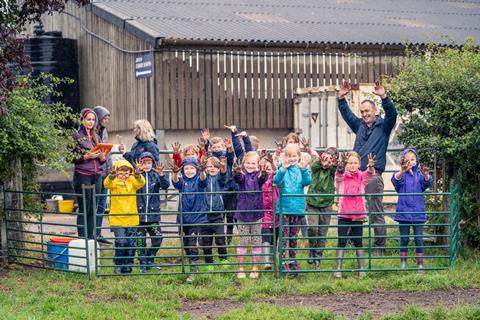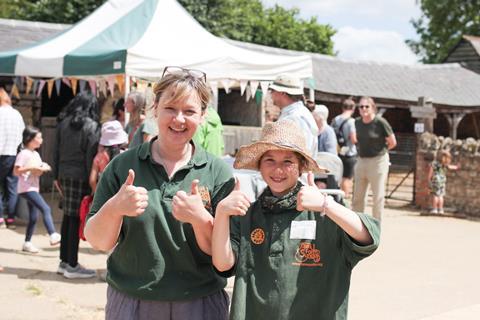LEAF’s passionate new CEO has big plans to scale up the sustainable farming organisation and make urgent changes to agriculture at a global level
David Webster’s links to LEAF go way back. When the sustainable food and farming charity was first formed by Caroline Drummond at The Royal Show in Stoneleigh Park in 1991, a teenage Webster was gardening in the grounds for work experience.

Then, in 2005, while employed by cereal producer Jordans and working to promote the company’s farm biodiversity programme, he encountered Drummond and LEAF professionally. And so began a long and colourful alliance that culminated in Webster joining LEAF as CEO in September 2023 following environmental pioneer Drummond’s sad and untimely death at the age of just 58.
“My sense is that LEAF, as an organisation, mirrors Caroline in many respects,” says Webster, speaking to FPJ just weeks after he left Associated British Foods as its UK grocery division’s sustainability director to take up his new role. “There were so many different aspects to her as an individual. So many things she would stand for and stand behind.”
Webster last spoke to Drummond as he prepared for an investor briefing on environmental farming early in 2022. “I wanted to make the case for Integrated Farm Management. Caroline agreed to contribute to a film about our work within the Jordans Farm Partnership, which is built around the LEAF Marque Standard with support from the Wildlife Trusts. We chatted over the phone as she drove home. I had no idea that she was quite so unwell,” he says.
“When, 18 months later, I ended up joining the LEAF team, it was a bittersweet moment. I would much rather Caroline was here, but it is also a great privilege. The more I’ve got into the role, the more amazing I realise LEAF is. The organisation does so much good work. The commitment of the whole team and the breadth of activity that we support is incredible.”
LEAF branches
LEAF has four key workstreams: Technical (Integrated Farm Management business programme), LEAF Marque (a global environmental assurance system recognising more sustainably farmed products), LEAF Education (public engagement in sustainable farming), and LEAF Open Farm Sunday (linking consumers, farming and food). Through these four pillars, the organisation’s long-standing remit is to create more resilient UK farm businesses with sustainable management practices that feed people affordably within planetary bounds.
During his first days in the job, Webster says he was struck by the “incredible” LEAF Marque-certified farms he visited, where British growers spoke positively of the benefits sustainable farming had brought them in terms of cost effectiveness and resilience.
Meanwhile, retail engagement with the LEAF Marque is growing faster than ever before, with the majority of UK supermarkets now adopting the environmental assurance scheme for their domestic and international fruit and vegetable supplies, led initially by Waitrose and, more recently, Tesco.

At the same time, the LEAF Education team worked with some 39,000 British schoolchildren of all ages over the last year to bring them closer to farming and inform them of opportunities within the land-based sectors. And over 200 UK farmers opened up their farms to the public for Open Farm Sunday, which attracted over 170,000 visitors on the day.
“I am very keen to ensure that our partners – and the wider farming community – have a more holistic view of LEAF as an organisation,” says Webster. “We are not simply about the LEAF Marque. Yes, we do a huge amount on assurance, but we also do a lot of work in terms of peer-to-peer networking and informing other farmers what best practice techniques look like. Linked into this is our work on education, to bring in new generations, and public engagement through outreach activities like Open Farm Sunday.
“Building a broader understanding of the totality of what LEAF can offer both in the UK and overseas, and engaging strategically with our key funding partners is where I see the future – with a view to building our scale and expanding the influence of what we can do in an increasingly global context.”
One only needs to think about the extreme and erratic weather the world has experienced over the last 12 months (2023 was confirmed as the warmest on record, driven by human-caused climate change and boosted by the natural El Niño weather event) to realise the urgent need to accelerate positive environmental change at scale, he adds.
Future vision
“I think Caroline and I shared the same vision: that things need to shift. We need to change what we are doing and how we are doing it. Not just for the good of the individual farms, but for the environment and society as a whole – into future generations,” says Webster.
“One of the reasons I took the job is that, increasingly, LEAF is going to be seen as an organisation that is at the sharp end of a structural transition in agriculture that is inevitably going to happen. It’s got to. As a society we are going to have to face into the need for more sustainable farm management – not just because it’s nice to do, or the right thing – which it is – but because it is also integral to climate risk mitigation, and essential to ensure we can continue to feed a growing population.”
Webster’s goal, he says, is to work out ways to do more, and find the right partners with which to do it. “Like Caroline, I take the view that we can build through collaboration and linkages wherever we can find common ground. There is so much collective effort to drive these solutions now.
“I think this business of scaling what Caroline has built, making it slightly easier for farm businesses to engage with LEAF and understand our specific role in helping them adapt to change, finding fellow travellers who are going on that journey, and working in partnership with them, is likely to drive our work for the foreseeable future.”
Climate change, the Covid crisis and current geo-political conflicts have brought the fragility of global food systems into sharp relief, adds Webster.
“We have an ethical and moral responsibility to feed people, as well as to sustain the environment,” he says. “How we balance doing so in a world where there is a growing population, where the pressures on the environment are increasing, and where if you look at what scientists are saying, weather patterns will become significantly more erratic, this is an urgent problem. LEAF, and LEAF Marque in particular, offer a route for commercially sustainable, well-run farming businesses to engage with that space in partnership with others.
“My vision is very clear: we are going to help scale the transition globally to more sustainable farming systems. We won’t be the only organisation that does it, but I can see that LEAF will continue to partner with other organisations globally that share our view and want to facilitate change.”
Global partners
Webster acknowledges that none of this will be easy. “We continue to engage with producers, academics and NGOs to understand the practicalities of delivering this at scale. We have to work in a way that is collaborative and supportive of each other, and fundamentally has the interests of farmers and farming businesses at heart to help them adopt the necessary changes,” he says.

“That can be difficult enough in the UK, but as we continue to grow our reach across the globe, some of these challenges become much more compounded, because frankly the risks perceived by individual farmers can be much greater.”
Webster cites the example of a smallholder rice farmer in Pakistan, India or Thailand. “We know rice is a huge emitter of methane, and we know there are management techniques that can reduce that by half,” he says. “But helping farmers to understand and adopt these techniques is complicated because you also have to be able to persuade them that by changing their traditional farming systems, they are not going to lose their crop, when their entire family’s welfare may well depend on it.”
The starting point, says Webster, is being clear about what needs to be fixed, and working with experts through the supply chain to identify the areas for effective intervention and how these relate to management standards. Then you need to figure out how to persuade farmers to apply the remedies in a way that’s not going to damage their commercial interests – for example, by helping them save money, reduce the risk of crop losses, or enabling access to new markets. And, finally, consider how best to replicate this model globally.
“LEAF won’t be alone in achieving this. We will be one of a large number of partners, and it will take time,” says Webster. “But the reason we do this well in the UK is because we are so well linked into the farming community. None of this works if it’s not practical. Being able to go out into the field and make the changes that promote environmental outcomes, while also sustaining food production, can be hard and complex. And I think that’s our job: to be at the intersection between the theory and the practical application – helping farmers to learn from experts and each other.”
Growers in the UK are very supportive of LEAF, and many in the fresh produce sector in particular have adopted the LEAF Marque standard, Webster continues. “They get it. They see it is a robust model,” he says. “But we can only be effective globally if we are capable of positively bringing producers to the table to unlock new solutions. And that’s where LEAF shines.”



